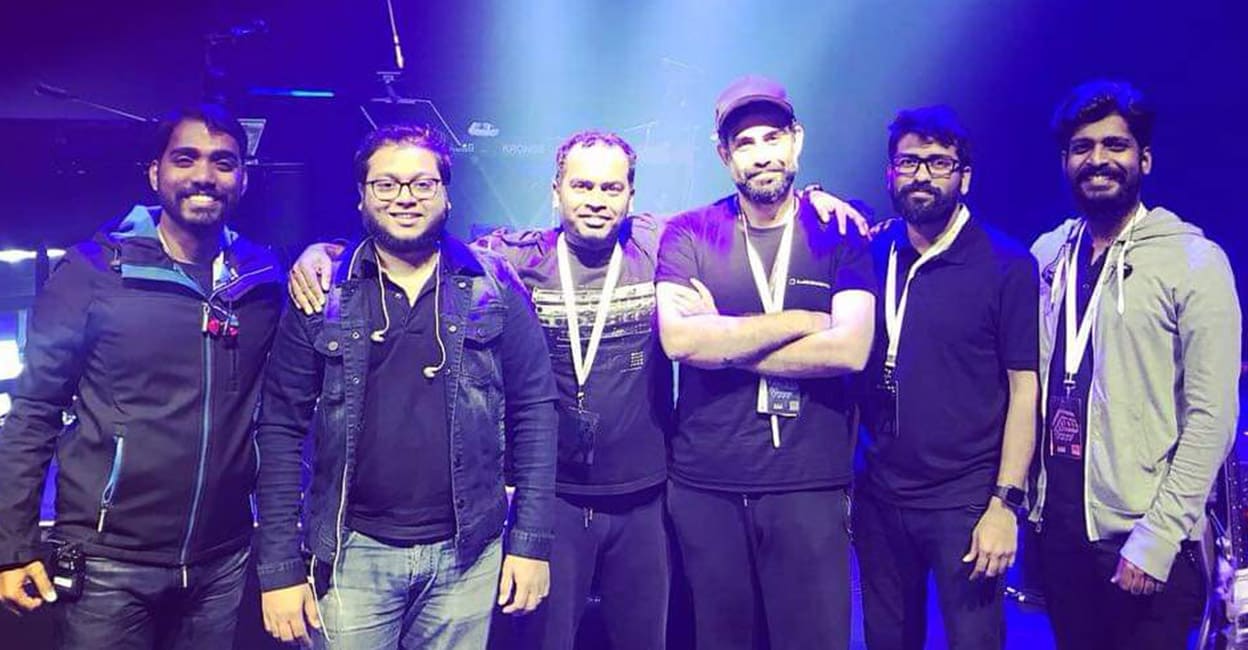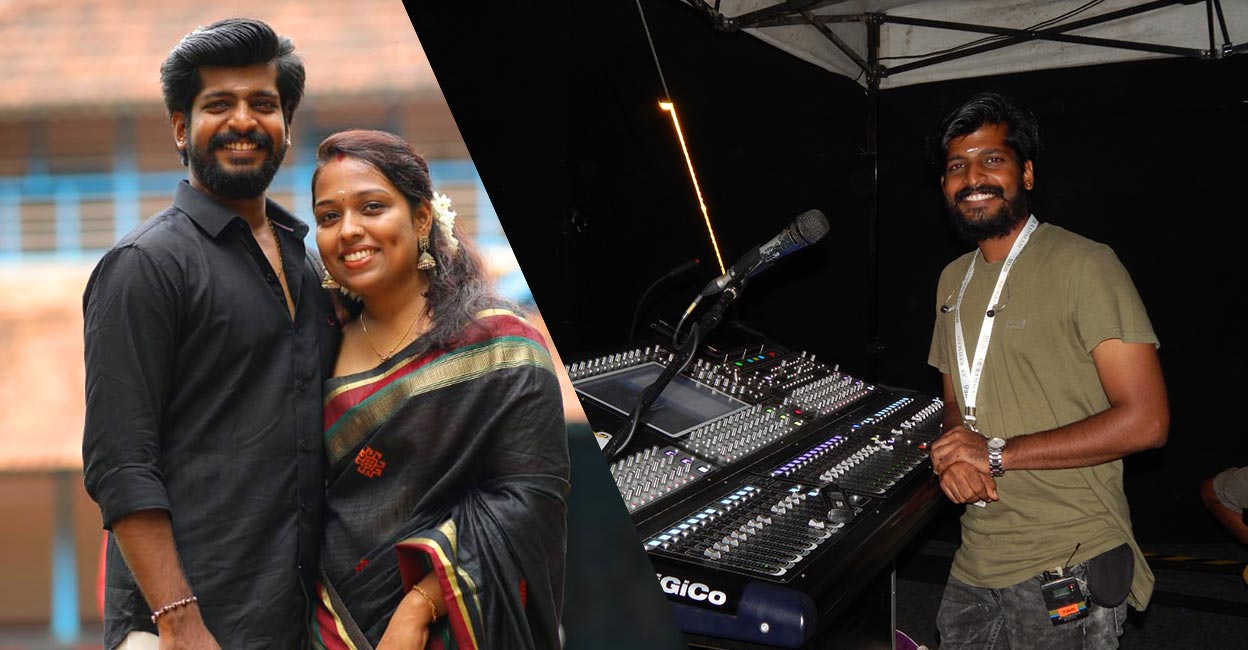Raghu Ramankutty opens up about his tryst with sound engineering

Mail This Article
We all love to watch our favourite musicians - who have entered our hearts through tunes they created - perform live before us. Nevertheless, these performances are made memorable experiences not just by the stars of rhythms, but also by a group of technical experts - live sound engineers; they sit in front of many computers and other equipment, between the artists and the spirited audience. They are the ones responsible for making the tunes presented live by the musicians pleasing to our ears and hearts.

Raghu Ramankutty is one such live sound engineer, one among the few Keralites who have gained skill and expertise in this field. Raghu was among the live sound engineers for Yuvan Shankar Raja’s recent live music programme which enthralled Chennai. He shares his experiences of working with legendary musicians including A R Rahman…
First learnt to play flute
I had learnt to play the flute and Mridangam when in school. Since my parents were fond of these percussion instruments, they sent me and my elder brother to learn it. My career today is designed by that decision taken by my parents. Even as I learnt percussion instruments, music programmes started becoming a passion for me. After some time, I too started doing some small stage performances. I developed a kind of curiosity and interest in those who arrange sound while doing music concerts (Kacheri).
It was during that period that I realized the importance of sound engineering – be it a live music performance or a studio recording. Initially, I did not know that it was highly demanding work or about the creative aspect of it. But then, I knew that my path was music and decided that my career would be related to music. Whatever my decision was, my family insisted on getting an undergraduate degree. I pursued B Com privately and completed it.
During that time, my focus was to learn music. It was in the final year of my course that I realized ‘Sound Engineering’ was the course that I was looking for. I decided to learn sound engineering wholeheartedly. It was then that a cousin told me about Stephen Devassy Chettan’s Muzik Lounge. I reached as one of the students in the first batch at that academy. That was the start.
The world of music … Sound.com
I pursued a one-and-a-half-year-long course at Muzik Lounge. Perhaps because it was the first batch, the students and the tutors shared a great friendship. The studio was just being set up there. So, we could also be part of the process. Those would remain experiences for a lifetime.
While studying sound engineering, we learn the different segments – sound mixing in films, recording in music, mixing, mastering, live sound engineering and all such aspects. As I used to perform concerts, I was more interested in live sound engineering. Those days, we would get opportunities to intern for live programmes in Chennai through Stephen Chettan (brother - fondly called in Malayalam). That was how I became part of a company called Sound.com. After an internship, I got an offer to work for them too. I relocated to Mumbai. Then, life journeyed through cities where music programmes happened; travel, music and nights became part of life.
The heaven in the midst of a crowd
Sound engineering is generally considered the technicality of recording a tune forever when it is created and regulating sound by arranging the microphone and the speakers. It is not just technical work. Instead, it is a blend of creative and technical aspects.
We can’t be sound engineers by merely having a mechanical blend. The sound engineer has a major role in creating a mood and maintaining it during a live music programme. We are to execute the basic thought of the audience to be able to listen to the music well, the wish of the singers and the instrumentalists that their voice (or that of the instruments) to be heard as they want, and ensure that the stage show director’s concept reaches the audience.
There are no retakes during a live programme like in the studio. One should have good music sense and good sound engineering skills at the same time. While doing live shows, we should blend both without wasting seconds. Sometimes it thrills, and sometimes it turns out to be the opposite

Each music programme is of different aptitudes. Some may be of Carnatic music while others may be of the highs and lows of flowing Sufi music with a spiritual impression. Sometimes it could be the fervour of popularity created by film music. Certain other times, it could be the highly enthralling tones of rock and metal. The greatest live sound engineering is arranging a sound system to aptly suit each of the genres.
It extends from setting up speakers for a small Carnatic concert to sound system at the legendary level live music shows of celebrity musicians with lakhs of audience.
Based on how big the programme is, the extent of preparations becomes higher. Considering whether it is an open space or a closed auditorium, the age group of the majority who are to attend the programme, whether it is during the day or at night, the preparations may extend for up to one week. Today, we have many software which can help in the live sound arrangement. Such software has helped sound engineering these days.
Any minor lapse may affect the artist, so each live programme comes with a little tension too. Every engineer listens to the song that is going to be presented many times before the programme. Similarly, sound checking is also carried out. Without these two, one cannot be a sound engineer for a live performance.
Take A R Rahman for instance. He presents his song on the stage entirely different from the original composition. If it’s a tour of the music programme, the song will be different on each stage. It is difficult to remember the tunes that have been recreated for so many songs.
Friendship is everything...
In the world of cinema and music, friendship presents ideas and opportunities. Here also it is the same. The friends whom I met during my internship times at Chennai invited me to Yuvan Shankar Raja’s recent live programme. I also invite them to several programmes.
Though music programmes are all about joy, security is important while working amid a crowd. Earlier, the crowd during a metallic band concert scared me a bit. The music itself is out of this world. Though we - the sound engineering team of 4 to 5 members- stood with barricades around us, sometimes certain crowds pose a threat to our safety.
Still, if we are working alongside those who are friendly, we will get over it. Most programmes finish around midnight or during the wee hours. In the initial days, it affects our daily routine and health. Then, that is the only way to move forward until it becomes a habit in the enthusiasm the job provides, keeping aside all health problems. It is when we work with good friends that we would be able to blend and effectively present our creativity and engineering skills without hurdles.
Times have changed, and so has sound
The time when people had to be told what sound engineering is all about has long gone. Now, many live music programmes are staged in Kerala also. I reached for Indiegaga’s programme in Kerala recently.
Today, people purchase tickets to watch live programmes, much like films, all over India. There would be no dearth of opportunities for the talented among those who learn live sound engineering. Mumbai, where I live, is a hub for such programmes. There are trustworthy organisers too. There would not be any compromise about remuneration and safety in Mumbai. Just that we should be ready to work hard and have a mind to change according to times.
Rahman sir is particular about the type of sound needed
We can say Rahman Sir started to include the names of the sound engineers in the credit without fail. He has particular specifications about the type of sound needed, and how its modulation should be presented, even in the case of instruments. Communication with the performing artist is crucial. It has been 10 years since I have been in the field. It is a very small period when it comes to a live sound engineer. However, I realised the significance of this communication from Rahman sir. During the earlier times, he does not talk much. That was his nature. If we do well, he won’t say anything. We would be happy if he does not utter a word. If not, the conversation with him would be a study class.
If the artists are well-versed in sound engineering, it would be a great help to us. Rahman sir is an expert in it. I have been able to work with many celebrities including Sivamani, Amit Trivedi, Yuvan Shankar Raja and Ranjith Barret. They all had a clear idea about live sound designing.
'It is not time, but passion that is important'
Many approach me and say they had wished to learn sound engineering in their young days, but they could not during their studies. They say they are working now and ask whether they can still learn sound engineering. It is a definite yes. Sound engineering is a course, not bound by time. We only need patience and skill. We must have a mind prepared to study continuously and a willingness to take risks.
Women’s presence in the field of live sound engineering is minimal, perhaps because of the time schedule. Hope that would be changed soon as people are getting attracted to the field.
'They are my energy and enthusiasm'
My house is at Panangad, in Ernakulam. Ramankutty, my father was a bank employee. Mother Malika was a college professor. They were my support and encouragement to pursue art along with music and later, to choose my career path. They only told me to get an undergraduate degree. My brother Madhu is a violinist although he works in the IT field. My wife Anitha has completed her M Ed.
So far, all who have worked with me - my seniors, contemporaries, and those who came later - have all helped, shared knowledge, and supported me in growing my career. They have stood by me. That is what I can never forget in this journey. They are the ones who boost my passion for the profession.
There are many sound engineers from Kerala here. Of them, Jayakrishnan Nalinakumar, Tennyson Chinnappan and Francis Kollanur are known to me from my school days. Their knowledge and experience are always an inspiration.
The founder of the company I work for, Warren D Souza, himself is a very zestful person. This is a place where a group of good people work tirelessly to achieve recognition for sound engineers and sound engineering.

